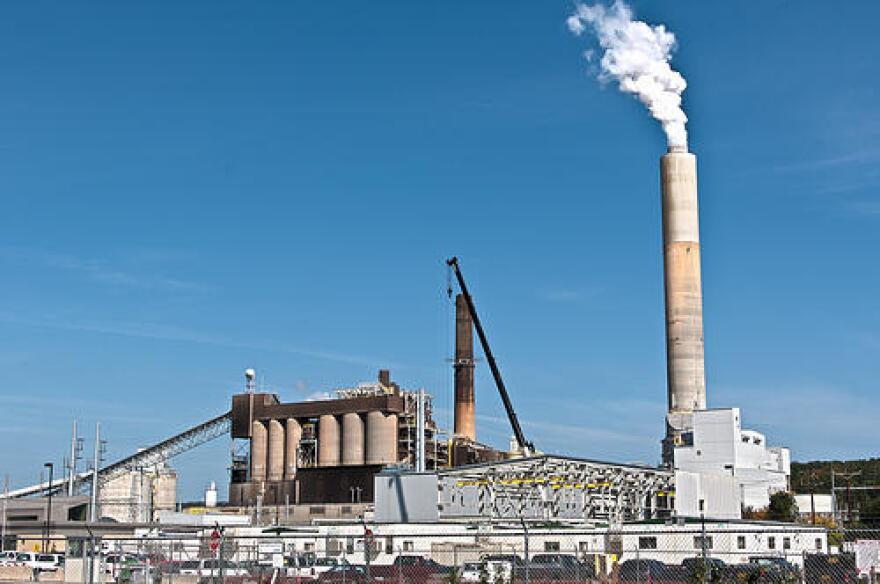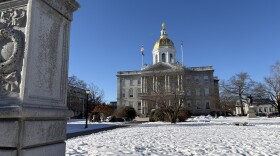The first law of thermodynamics says that energy cannot be created or destroyed, but it can change from one form to another. One of those forms is heat. And now an entrepreneur in New Hampshire says he has found a way to make use of the heat given off at power plants to increase the efficiency of those power plants and generate more electricity.
Granite Geek David Brooks, a reporter at the Concord Monitor, joins All Things Considered host Peter Biello to explain how this works.
(This transcript has been lightly edited for clarity.)
So who is this researcher and what does he create?
His name is Joe Kellog and he's your kind of your classic one-man entrepreneur startup down in Hudson, on the Mass. border. He's a mechanical engineer, and like many engineers it kind of drives him crazy that there's a lot of waste heat generated by power plants and industrial processes - excess heat that just has to be gotten rid of. And he can do work, if you can harness it. So he thinks he's found a way to do that in certain circumstances. The special tool he's got is a type of shape-changing alloy. So there are alloys -- this is titanium and nickel, perhaps some other things in there -- alloy, that literally changes shape under certain circumstances and then remembers its previous shape. So it'll go back to it when those circumstances are removed. These are really cool but not well understood materials. And he thinks he's got one that can change shape under fairly low temperature changes - enough that it can turn the waste heat from a power plant into usable electricity.
And why is that important?
Well, it's important because power plants generate a lot of excess heat. I mean, you see the steam coming out the top, the cooling towers at the nuke plant. The coal plant in Bow, for example, has to use a lot of Merrimack River water to cool itself and then dumps the warm water back into the river. So if you could instead turn that heat into electricity, because that's the way most electricity is generated, is by boiling basically, boiling water and using the steam to turn a turbine. The waste heat that's generated by most power plants and industrial processes isn't hot enough to boil water so it's difficult to get the work out of it. But if you can you could, instead of throwing the stuff away, you can turn it into something that's sellable and usable.
So this metal has a certain shape, it can change shape based on a very low temperature change - about 20 degrees?
20 degrees is what he says, what Joe Kellogg says.
And so the motion of changing shape is what generates the electricity, how?
Yeah, the system he's put together is, it basically uses lots of, I think it's a dozen or so, long thin rods, about a half meter long. They look like long black pencils, sort of. And he puts them in a unit, in which when warm water is poured on them from the power plant they expand only about 3 percent in length, so we're not talking about a lot, but that's enough to push some hydraulic fluid. And if it's done right, the hydraulic fluid can go and turn a generator and produce electricity. And then the cool water is dumped on them and they shrink again, and then warm water and they expand. And cold water and they shrink, and they do this every three seconds, day-in and day-out. And if his best-case scenario works, he thinks that stacking a bunch of these units inside a power plant, using the waste heat that's already there, so not burning more fuel but using waste heat, he could produce perhaps as much as 10 percent more electricity from a given power plant which would be quite a big deal for the owners of that plant.
Are there any environmental benefits that come along with this?
Oh absolutely, and that's definitely part of the business plan, and I think probably why he's peddling it to power plants - is they have to get rid of their waste heat. And there are environmental problems, again the plant in Bow, with the warm water in Merrimack River, the EPA in the past has threatened them with all sorts of fines if they don't stop dumping so much heat into the river. So if they can take that heat and instead turn it into something they can sell, that would be sort of a double benefit.
You also report that, for Joe Kellog, New Hampshire's state government was more conducive to growing this kind of business than his home state of New York. Why was that for him?
How about less unconducive, perhaps that's a better way to say it, because he said basically, you know, New York will do more for you but will also get in your way more. And from his point of view, in his particular kind of, what he's trying to do, it's better to have governments not be in the way than to help. He talked about how he liked the way the government here is relatively flat and the distance between the person to the front desk and the governor is much shorter than in a larger state government.
(David Brooks is a reporter for The Concord Monitor who warms us all with the power of his geeky thoughts at GraniteGeek.org.)









